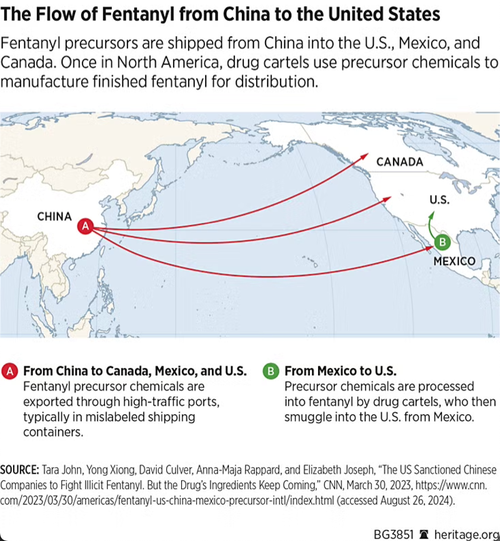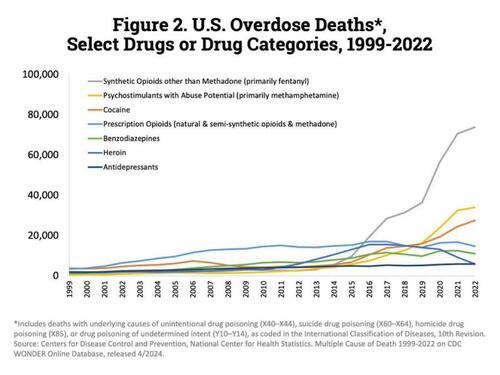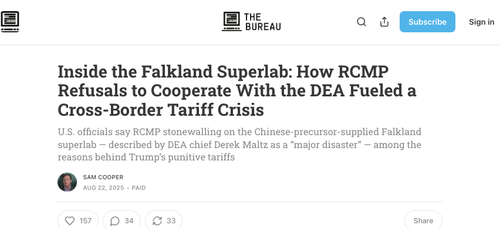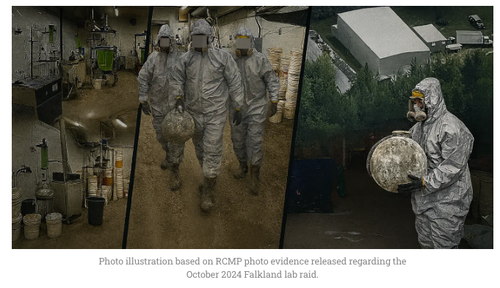Canada’s Refusal To Cooperate With DEA On Fentanyl “Superlab” Investigation Fueled Cross-Border Tariffs
President Trump’s new hemispheric defense strategy, stretching across North, Central, and South America, now includes the deployment of 4,000 troops and three guided-missile destroyers positioned in international waters off Venezuela, as part of a broader campaign to dismantle command-and-control hubs of narco-terrorists and purge Chinese-linked drug and money-laundering networks from the region.
Last week, the Pentagon positioned three Aegis guided-missile destroyers (the USS Gravely, USS Jason Dunham, and USS Sampson) directly off the coast of Venezuela as new force posturing takes hold in the region, with the Pentagon’s crosshairs focused on narco-terrorists fueling America’s drug death crisis that claims 100,000 lives per year.
Simultaneously, attention turns to Canada, which, like Mexico and other surrounding countries, remains a very weak partner in the region as the Trump administration advances its hemispheric defense strategy to clean up the Americas ahead of the 2030s. Trump’s cleanup of the Western hemisphere is almost comparable to his micro efforts to restore law and order in crime-ridden Washington, D.C. – and soon, in many other cities nationwide left in ruins by failed Democratic leadership that allowed violent crime and open-air drug markets to flourish.
Sam Cooper of the investigative outlet The Bureau has uncovered in recent years that North America’s fentanyl crisis is not just a drug death crisis wiping out military-aged men and women by the hundreds of thousands – it’s also a sprawling international money-laundering machine, run through Chinese Triads, Mexican cartels, and Canadian financial networks in a massive transnational crime web that fuels the crisis. Some view this operation to subvert Washington as Chinese irregular warfare, explained here.
Cooper’s work, as we’ve covered in recent years, spans Chinese narcos using laundering networks via TD bank and other Canadian financial institutions to “Breaking Bad-style” superlabs in Canada to all things China subverting the Americas…
-
Busted Fentanyl Super Lab In Canada Makes “Breaking Bad Look Minor League”: Former Trump Official
-
Chinese Intel-Linked Bankers Reportedly Fundraised For L.A. Mayor Karen Bass
Cooper’s latest report focuses on how Canada’s federal police (RCMP) refused to cooperate with the U.S. Drug Enforcement Administration (DEA) in 2022 on a probe into a British Columbia fentanyl “superlab” tied to Chinese precursor shipments. It was only after the U.S. Treasury sanctioned Iranian-Canadian businessman Bahman Djebelibak and his Health Canada–licensed Valerian Labs that the RCMP belatedly launched its own investigation, without sharing critical information with the U.S. Gov’t.
The superlab in Falkland, B.C. was eventually raided and dismantled, with investigations suggesting the lab was able to produce drugs on an industrial scale:
- Drugs: 54kg fentanyl (95 million lethal doses), 390kg meth, 35kg cocaine, 15kg MDMA.
Last year, Derek Maltz, Acting DEA Administrator, commented on the botched RCMP investigation, blasting the RCMP: “The way they conducted business was disgusting, honestly. We can’t have that kind of activity when our countries are being attacked at levels we’ve never seen.”
Former current and senior U.S. officials told Cooper that Ottawa’s problem isn’t just incompetence – it’s structural. Weak, antiquated laws. It appears politics paralyze leadership, and corruption runs all the way to the top.
Meanwhile, the investigation into the Falkland raid was a dark reality: Chinese underground bankers in Vancouver and Toronto move hundreds of millions through Canadian and U.S. banks, laundering cartel money and financing fentanyl labs. None of this is new, but what is, in the era of Trump, will all be dismantled.

Fast forward today, Ottawa has learned the hard way with a tariff war with Trump, following years of inaction and botched investigations into fentanyl superlabs in its country that fuel America’s drug death crisis.
Here’s an excerpt of Cooper’s latest report:
Canada’s federal police refused to investigate or cooperate with the United States Drug Enforcement Administration on a British Columbia fentanyl superlab probe tied to chemical-precursor shipments from China into Vancouver in late 2022, according to senior U.S. officials. More than a year later — only after the U.S. Treasury sanctioned Iranian-Canadian businessman Bahman Djebelibak and his Health Canada–licensed company Valerian Labs, naming them as part of a Chinese fentanyl trafficking syndicate that Washington sought to disrupt — did the RCMP finally open a siloed investigation. The force continued to refuse coordination or information sharing with the American agents who had initiated the case. In an exclusive interview, Derek Maltz, DEA Acting Administrator in 2025 with oversight of the matter, called the B.C. superlab case a “major disaster.”
This explosive information, confirmed to The Bureau by current and former senior U.S. officials, has never before been reported in the Falkland, B.C., superlab case, which was covered internationally by outlets including The New York Times. It amounts to a rare public rebuke that elevates the matter from a Canadian policing failure into a high-consequence geopolitical dispute.
It also helps explain Washington’s decision on July 31 to impose 35 percent tariffs on Canada, reinforcing President Donald Trump’s claim that senior officials had warned him Ottawa failed to cooperate or devote sufficient resources to interdictions against Chinese- and Mexican-linked drug trafficking networks blamed for killing hundreds of thousands of North Americans. Three weeks ago, in a statement underscoring intelligence tied to the Falkland lab case, the White House said: “Mexican cartels are increasingly operating fentanyl labs in Canada.” It added: “Canada-based drug trafficking organizations maintain robust ‘super labs,’ mostly in rural and dense areas in western Canada, some of which can produce 44 to 66 pounds of fentanyl weekly.”
‘A major disaster on that big lab in British Columbia’
In multiple interviews with senior officials — including Derek Maltz, who retired this year after Mexico carried out an unprecedented wave of extraditions of dozens of cartel leaders to the United States — The Bureau confirmed devastating details of the Falkland superlab in British Columbia, hidden in mountainous terrain between Vancouver and Calgary. The case became public only in October 2024 — to the surprise of DEA investigators — when the RCMP announced it had dismantled what it called the most sophisticated drug laboratory ever uncovered in Canada, capable of producing up to 95 million potentially lethal doses of fentanyl. Investigators seized a staggering half-ton of narcotics: 54 kilograms of fentanyl, 390 kilos of methamphetamine, 35 kilos of cocaine, 15 kilos of MDMA, smaller amounts of cannabis, and large quantities of precursor chemicals from China. Police estimated the street value at about $500 million.
The raid also exposed the militarized posture of Mexican cartel–style operations, with 89 firearms — including handguns, AR-15-style rifles and submachine guns, many loaded — along with explosive devices, ammunition, silencers, high-capacity magazines, body armor, and roughly $500,000 in cash. So far, only a man named Gaganpreet Singh Randhawa, believed to be a lower level suspect, has been charged after the RCMP’s raid on the Falkland lab and related Vancouver-area properties. What Ottawa failed to share with Canadians, U.S. sources say, is that the DEA’s Newark, New Jersey office had already delivered the case to Canadian authorities through the U.S. Embassy in Ottawa nearly two years earlier — warning of precursor shipments tied to Djebelibak’s company, Valerian Labs. Canadian police, the officials said, not only declined to cooperate but also delayed launching their own siloed probe until after Washington imposed sanctions on Djebelibak in October 2023.
“The way they conducted business was disgusting, honestly,” Maltz said in an August 2025 interview. “And we can’t have that kind of activity when our countries are being attacked at levels that we’ve never seen in the history of our countries.”
Maltz, who limited his remarks to high-level confirmations, agreed with numerous other U.S. officials interviewed by The Bureau that the Falkland breakdown was neither isolated nor new — but part of a recurring pattern of refusal and delay in Ottawa’s dealings with American law enforcement.
“Over the years, we’ve had historical issues with the RCMP not sharing properly, and most recently there was a major disaster that happened on that big lab in British Columbia,” Maltz confirmed.
“The superlab was part of some ongoing stuff going on with DEA New Jersey. There was a major frustration with the DEA agents in the United States that had investigative equity and investigative knowledge on this particular case. And we were trying to share and cooperate. And it was a major problem.”
Like other senior U.S. experts interviewed by The Bureau this year regarding Canada’s increasing exploitation by Chinese and Mexican fentanyl networks, Maltz said Ottawa’s repeated inability to investigate and prosecute major drug trafficking and money laundering networks — and its frequent refusal to cooperate with international allies — stems from a combination of weak, outdated laws and ineffective leadership.
Other U.S. and Canadian police experts also warned they believe the RCMP and relevant Canadian agencies such as Canada Border Services suffer from significant corruption concerns.
“It goes down to the basic information sharing, the antiquated laws, that people are not stepping up and not leading the efforts,” Maltz said of the Falkland lab case. “When I was Acting Administrator, I met with the current leadership and it was actually sad because these guys came to see me and they want to do the right thing. They say all the right things, but they’re so far behind and the laws are so antiquated and so archaic.”
In an interview, Donald Im, who retired in 2022 after a long career as a senior DEA official, described the synthetic narcotics overdose crisis in North America — fueled by Chinese Communist Party chemical suppliers and cartel distribution networks — as a “slow motion, weapons of mass destruction that exposes the vulnerability of whole nations and regions.”
As part of the DEA’s Special Operations Division, Im oversaw sprawling investigations into global Chinese money laundering systems and fentanyl precursor supply chains. He said he provided support to the New Jersey DEA probes that became a linchpin of the agency’s strategy and indirectly tied into the Falkland superlab case. These investigations exposed how Chinese underground bankers — often operating from Vancouver and Toronto — were moving staggering nine-figure flows — in some cases, hundreds of millions within months — through U.S. and Canadian financial institutions, as well as through international trade routes between China, Mexico, Canada, and South America, to sustain the fentanyl trade.
Those innovative cases, Im said, connected Chinese laundering networks across North America to an extraordinarily wide array of actors, demonstrating that seemingly local probes connected to the same global syndicates moving precursors from China, laundering through Canadian and U.S. banks, and producing fentanyl on an industrial scale in hidden labs across Canada.
Im added, in his opinion: “If only one person was arrested in that sophisticated Falkland laboratory? It is either the RCMP is incompetent or, politically, they’ve been neutered.”
That assessment is supported by previous case studies. Another source for this story — deeply troubled by the RCMP and Canadian prosecutors’ decisions not to pursue major targets uncovered in probes of drug-laundering networks tied to Chinese, Iranian, and Mexican syndicates — said they learned the RCMP, while conducting a major investigation into Iranian state-linked drug launderers in Toronto and Montreal, stumbled onto a Chinese suspect moving $600 million in just six months. Yet when briefed, the DEA was told the RCMP would not pursue the case, citing a different investigative focus.
We reached out to the RCMP. They said “No”
While Derek Maltz spoke only at a high level about Washington’s concerns with Ottawa’s handling of the Falkland case, another U.S. official provided a more detailed account of the behind-the-scenes drama between American and Canadian agencies.
The U.S. government source, who had direct knowledge of the case and requested anonymity due to ongoing investigations, said that in late 2022 the DEA’s Newark, New Jersey office alerted colleagues at the U.S. Embassy in Ottawa to precursor shipments from China bound for Valerian Labs, Inc., a Port Coquitlam–based company owned by Bahman Djebelibak, publicly known as “Bobby Shah” …
The rest of the report can be viewed on The Bureau’s Substack…
Tyler Durden
Sat, 08/23/2025 – 11:05ZeroHedge News







 R1
R1
 T1
T1


